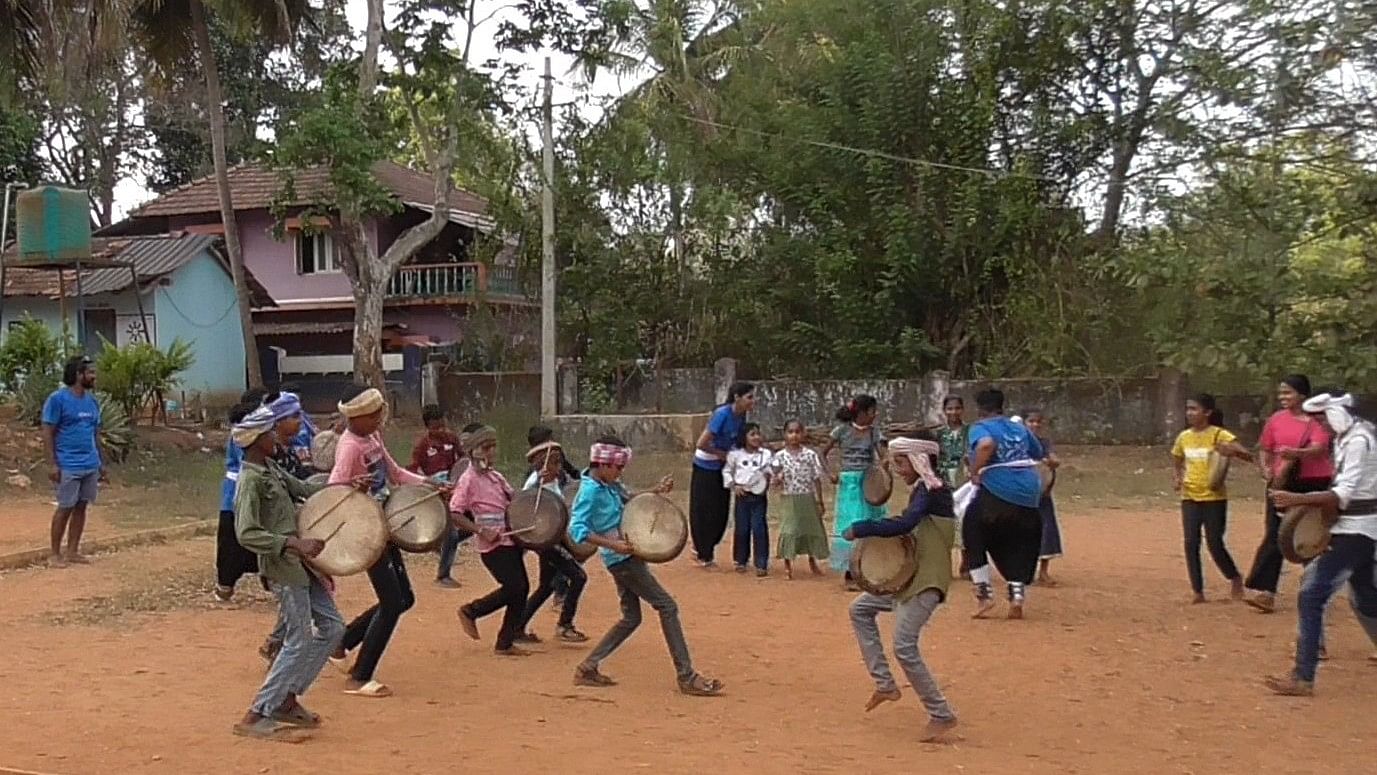
Credit: By Special Arrangement
"I want to address things at the grassroot level," says Naveen Tejaswi, the recent TOTO award winner (for creative writing in Kannada), who has started an art school for his village’s children. In his speech at the awards ceremony, Naveen had said he would be using the prize money to fund a project in his village.
“If someone from a marginalised community wins, it is the community that wins,” he had said. He wanted to give back to the community where his films’ stories took birth. That is how ‘Bheema Shaale’, an art centre with various activities and programmes, was started early this month in Hosabale, Shivamogga.
Programmes began with a tamate workshop organised along with the Adavi Arts Collective from Bengaluru in the first week of April. Twenty-five children attended the workshop and performed before the village on the last day. Around 150 people gathered to watch. “It had been a long time since the entire village gathered together. People have been so busy that art has taken a backseat,” Naveen explains.
Giving back to the community is a noble cause, says Naren from the Adavi Arts Collective, which works towards promoting folk music and dance among children in Bengaluru slums. “Bheema Shaale is a wonderful initiative that tries to shape the minds of tomorrow by exposing them to different fields,” he says.
Bheema Shaale was officially inaugurated that day as they celebrated Ambedkar Jayanthi. The name of the school is a homage to Bhimrao Ambedkar. The idea was to call it ‘Bheemana makkala shaale’ (a school for the children of Bheema), says Naveen.
‘Exposure through art’
People usually only address the tip of the iceberg, when it comes to representation, says Naveen. Citing the film industry as an example, he explains that while there is conversation around not having representation, nobody cares about why it is so. “Why is there no actor from our village in the industry? Because they do not know such a ‘profession’ exists. If this is addressed today, then in 20 years, someone may rise from here,” he adds.
Some children in the village are interested in painting but are not aware of how to make it a career. “There is not much representation from the villages in the art field,” he says and adds, “Art is the highest form of resistance.”
Naveen hopes to give the children exposure to different art forms, to be able to drive their dreams, and most importantly, keep them in school.
“English is the gateway to this exposure,” believes the 27-year-old filmmaker, who now conducts spoken English classes at the centre. About 60 children attend the classes. Each class is divided into three parts. Naveen teaches theory first, discusses the concepts with the children, and then they watch a film together. Naveen has borrowed his friend’s projector to screen films. “They are able to form small sentences efficiently now,” he says.
The children recently watched Majid Majidi’s Iranian classic, Children of Heaven. A video shared by Naveen shows the children cheering to the climax of the film — the boy winning the running race. They have also seen Steven Spielberg’s E.T. the Extra-Terrestrial and Chris Columbus’ Home Alone. Yogeshwari M (11) says she enjoyed watching the latter. “It was amusing to watch Kevin lay traps for the thieves,” she adds. They have also become fans of popular bands like The Beatles and Coldplay.
Sociopolitics of the village
Hosabale is a small hamlet nestled in the ‘are-Malnad’ (semi-hilly) region of Shivamogga. The village has about 300 houses. The majority of the village’s population is from the Deevaru (a tribal community categorised as OBC) and Adi Karnataka communities. There are a few Brahmin households that own a large proportion of the land.
“Children from the privileged community study in better schools outside the village but most of the children here who attend the government school come from the working class,” says Naveen. He is a first-generation graduate from his community and perhaps the only one who was able to study further.
With no one at home to help children with their homework, students feel demotivated and eventually drop out of school. “A lot of them who attend the camp here have already dropped out of school. It is a systemic problem,” he says.
Another demotivating factor is the status of the government school. The windows and benches are broken, the walls and the roof is on the verge of collapsing. Tanay M (12) who attends Bheema Shaale, says, “Classes in school are boring. In Bheema Shaale, we have fun while learning.”
Beyond film and art, he plans to conduct nature and star-gazing camps in May. His friend, a star gazer, will bring his telescope to the camp. Naveen also plans on opening a children’s library and introducing theatre and filmmaking workshops to make Bheema Shaale a year-round programme.